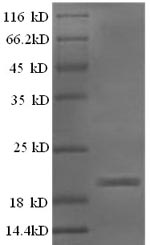Recombinant Sheep Interferon gamma (IFNG) is produced through an E. coli expression system, which appears to provide reliable production of the full-length mature protein spanning amino acids 24 to 166. The protein carries an N-terminal 6xHis-tag that helps with purification and detection processes. This product shows a purity level greater than 90% when verified through SDS-PAGE analysis, suggesting it may be suitable for research applications where high purity matters.
Interferon gamma (IFNG) represents a key cytokine within the immune system. Its primary role involves modulating immune responses, though its effects can be quite complex. The protein activates macrophages and enhances antigen presentation - functions that likely contribute to pathogen defense mechanisms. IFNG also participates in various signaling pathways that regulate immune processes, which is why immunology researchers find it such an interesting subject to study.
Potential Applications
Note: The applications listed below are based on what we know about this protein's biological functions, published research, and experience from experts in the field. However, we haven't fully tested all of these applications ourselves yet. We'd recommend running some preliminary tests first to make sure they work for your specific research goals.
The sheep IFNG is a cytokine that requires correct folding, including specific disulfide bond formation, for bioactivity (e.g., receptor binding and immune cell activation). E. coli, as a prokaryotic expression system, may not efficiently form disulfide bonds or replicate eukaryotic folding environments, potentially leading to misfolding. The His tag could sterically hinder proper folding or bioactivity. While high purity reduces impurities, it does not guarantee native conformation. Without experimental validation (e.g., circular dichroism for secondary structure or bioactivity assays), the protein may be misfolded and inactive. Therefore, correct folding and bioactivity cannot be assumed and must be verified before functional applications.
1. In Vitro Immunological Assays for Sheep-Specific Research
If the recombinant IFNG is verified to be correctly folded and recognized by specific antibodies (e.g., through Western blot or ELISA validation), it could be used as a standard or positive control in immunoassays. However, if misfolded, it may not bind antibodies effectively, leading to inaccurate quantification. Validation against native IFNG from sheep sources is essential for reliable results.
2. Antibody Development and Characterization
This recombinant IFNG can be used as an immunogen for antibody production, as antibodies often recognize linear epitopes even in misfolded proteins. The His tag facilitates purification and immobilization for screening. However, antibodies generated may not bind native IFNG in physiological contexts due to conformational differences. Antibody specificity should be validated against eukaryotic-expressed or native IFNG for applications like immunofluorescence or flow cytometry.
3. Protein-Protein Interaction Studies
If the recombinant IFNG is correctly folded, it could be used in pull-down assays to identify binding partners (e.g., IFNGR receptors). The His tag allows immobilization. However, if misfolded, interaction results may be unreliable due to altered binding sites or non-specific tag-mediated binding. Any findings must be confirmed with bioactive IFNG from eukaryotic systems.
4. Comparative Protein Structure and Function Analysis
The protein is suitable for basic biophysical characterization (e.g., circular dichroism to assess secondary structure, dynamic light scattering to monitor aggregation). However, bioactivity is required for functional comparisons across species. If misfolded, structural data may not reflect native function. Validation of activity is needed for meaningful evolutionary insights.
5. Cell Culture Supplementation for Ovine Cell Lines
This application requires bioactive IFNG to stimulate immune responses. If the protein is verified to be active (e.g., through cell-based assays like STAT1 phosphorylation), it could be used in cell culture. However, if misfolded, it will fail to induce effects, leading to false negatives. Activity must be confirmed before use.
Final Recommendation & Action Plan
Before using this recombinant sheep IFNG for any functional application, prioritize experimental validation of its folding and bioactivity. Start with biophysical assays (e.g., circular dichroism to check for expected α-helical content) and functional tests (e.g., ELISA with anti-IFNG antibodies to confirm antigenicity, or cell-based assays using ovine cells to measure STAT1 activation or MHC class II induction). If bioactivity is confirmed, proceed with intended studies; otherwise, limit use to non-functional applications like antibody production, but always validate antibodies against native IFNG. For reliable results, consider expressing IFNG in a eukaryotic system (e.g., mammalian cells) to ensure proper folding and disulfide bond formation. Avoid functional assays without prior activity confirmation.






